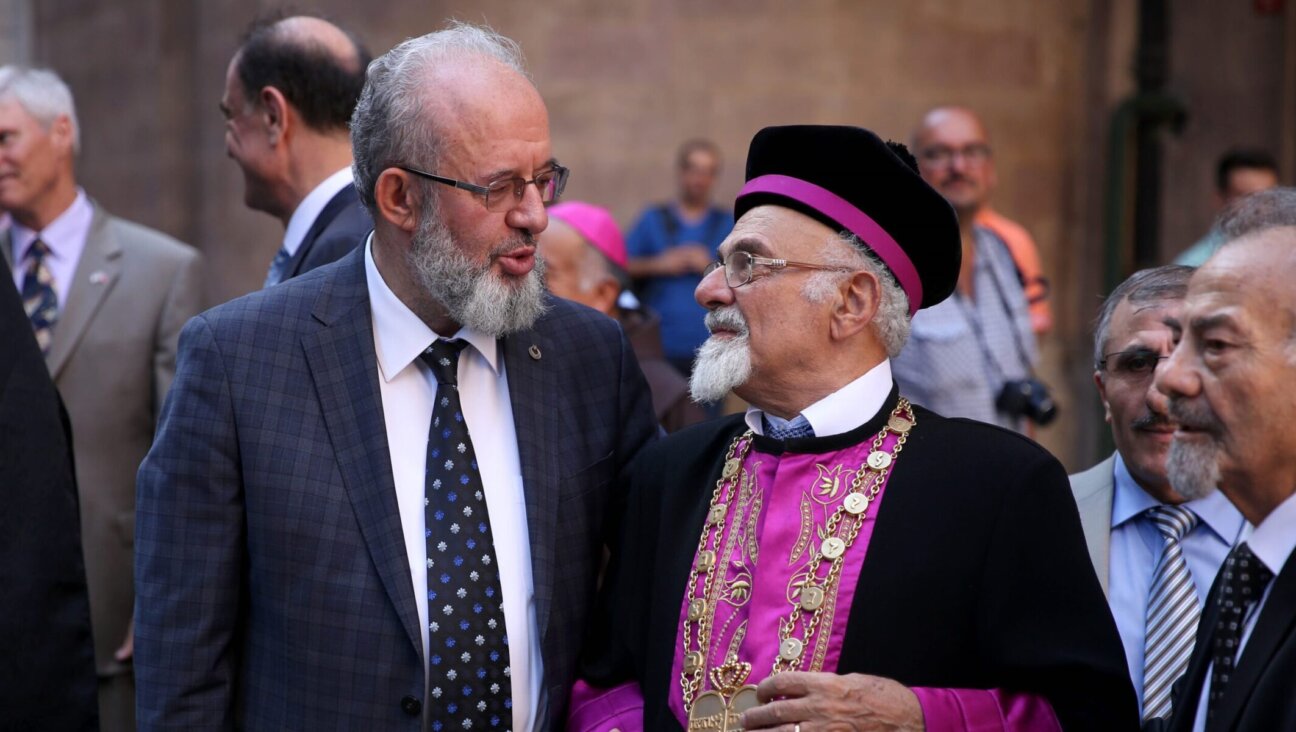A Thriving Synagogue Hired Its First Female Head Rabbi. Here’s Why That Matters.

Temple Israel Center’s main sanctuary. Image by Courtesy of Temple Israel Center
Most job interviews are little more than sitting in a windowless room, answering questions from a manager with your resume in one hand and coffee in the other.
For rabbis aiming for the pulpit, they’re a little different.
This past winter, Temple Israel Center, a large Conservative synagogue in Westchester County, New York, had four candidates come to its campus for weekend-long “interviews.” These finalists were on display at multiple prayer services and gatherings, giving a Sabbath morning sermon, leading a teaching session and sitting for a question-and-answer session with over 200 synagogue members in attendance.
For Beth Grafman, who sat on the search committee, one rabbi stood out — Rabbi Annie Tucker — for her calm, thoughtful and insightful performance across this rabbinic decathlon. In February, they offered her the job, and she accepted.
“And the fact that she turned out to be a woman, it wasn’t part of the selection process per se,” said Grafman, “it was a cherry on top of the process.”

Rabbi Annie Tucker Image by Courtesy of Annie Tucker
Tucker, 42, is joining a small circle of women rabbis who lead some of the largest Conservative congregations in the country. While egalitarianism is the watchword at nearly every synagogue in the movement, whether due to tradition or trepidation the senior roles of some of the most influential pulpits have eluded women. Female rabbis say Tucker’s hire is another victory for Jewish women.
“This was a big long search, and the fact that it went to a woman is something that we’re really proud of,” said Rabbi Debra Newman Kamin, president of the Rabbinical Assembly, the movement’s professional association for rabbis.
Women have been ordained rabbis only since 1985 in the Conservative movement, the centrist denomination of American Judaism, which upholds Jewish law but has often reinterpreted it to keep up with changing norms in secular society. It counts roughly 570,000 members in its synagogues, roughly a fifth of American Jews — a number that has been in decline in recent decades. Of the 57 or so Conservative congregations with more than 750 member families, only handful are led by women.
Adas Israel, in Washington, D.C., with over 1,700 families, is co-led by Rabbi Lauren Holtzblatt. Congregation Beth Shalom, Seattle’s largest Conservative synagogue, has been led by Rabbi Jill Borodin since 2005. Rabbi Amy Wallk Katz leads Temple Beth El, in Springfield, Massachusetts. Multiple experts told the Forward that they do not know of any studies quantifying the number of female rabbis in senior roles at Conservative synagogues. The United Synagogue of Conservative Judaism declined to share a list of the movement’s largest synagogues with the Forward.
The Jewish world still struggles with equity and pay parity for female clergy. In the Reform movement, women in senior rabbi roles are paid on average 85% of the salaries of men in similar roles. In Modern Orthodoxy, a contentious debate is ongoing about whether women can have the title of rabbi, or even lead joint prayer services.
TIC occupies a large, sprawling red brick building in the very Jewish suburb of White Plains. The area is replete with Jewish communities of all kinds, from Reform and Reconstructionist to Hasidic enclaves. The synagogue’s main sanctuary sees about 200-300 congregants a week, but expands on holidays into its social hall to fit its 750 member families.
For nearly a quarter century, until 2018, TIC was led by Rabbi Gordon Tucker, (of no relation) a nationally known rabbi for his work on allowing female clergy in Conservative Judaism and an adjunct professor at the Jewish Theological Seminary in New York. TIC’s search process to replace him was spread over two years. In the synagogue’s first round of searching, it declined to make a job offer to any of the candidates it hosted for a Shabbat weekend. They decided instead to hire an interim rabbi and continue with the search.
“We always had a view that we were looking for the right fit, and that we wouldn’t settle,” said Marc Berman, TIC’s president. The synagogue’s search committee, with 23 members, ultimately agreed that Tucker was the rabbi for the job.
“Gender was never an issue,” said Berman. “We were looking for the best candidate.”
Tucker said that she felt that the community was the right fit for her. It’s closer to her family and friends on the East Coast, and there is a strong focus on education for both children and adults in the synagogue.
“It’s a lot of very thoughtful, interesting, interested Jews,” she said.
Like Westchester County’s Jewish community, TIC’s membership is diverse, drawing in observant Conservative Jews who send their children to day school, as well as congregants that attend only for major holidays and enroll their children in the area’s public schools.
Helping to further unite TIC’s “micro-communities,” as Tucker called them, is one of the mandates she has going into her new role. She hopes to do that by “re-imagining” their children’s educational program and adding more social justice-oriented programming and events.
Tucker will become Temple Israel Center’s first female senior rabbi — just its fourth senior rabbi since the late 1930s — and one of the few female rabbis leading large Conservative congregations in the New York City area. She was also the first female senior rabbi at her current synagogue, in Wilmette, Illinois.
Female rabbis in the movement see Tucker’s hire as a sign that, while things aren’t changing as fast as they’d like, they are trending toward equal leadership of the movement between the genders.
“The fact that this is news shows us that the Jewish community has not been where it’s needed to be on women’s leadership for a while,” said Rabbi Danya Ruttenberg, an author and contributor to the Forward who is a colleague of Tucker’s in Chicago.
The Conservative movement is not past the point where such hirings should be singled out and celebrated, said several people who spoke with the Forward.
“I’m conflicted always, as to whether it’s something to point out or not,” said Rabbi Rachel Ain, who leads the Sutton Place Synagogue in New York, which has 500 member families. “But until it’s something we don’t need to point out anymore, we should applaud the hiring.”
Tucker said she hopes that her new role will allow other women to imagine themselves as leaders of large Jewish organizations.
Ain noted that Tucker’s hiring also comes as the United States is questioning its own readiness to have a female leader in the White House.
“We’re not there yet in the world,” she said. “This is still part of the landscape, spoken or unspoken.”
Ari Feldman is a staff writer at the Forward. Contact him at [email protected] or follow him on Twitter @aefeldman
A message from our Publisher & CEO Rachel Fishman Feddersen

I hope you appreciated this article. Before you go, I’d like to ask you to please support the Forward’s award-winning, nonprofit journalism so that we can be prepared for whatever news 2025 brings.
At a time when other newsrooms are closing or cutting back, the Forward has removed its paywall and invested additional resources to report on the ground from Israel and around the U.S. on the impact of the war, rising antisemitism and polarized discourse.
Readers like you make it all possible. Support our work by becoming a Forward Member and connect with our journalism and your community.
— Rachel Fishman Feddersen, Publisher and CEO
























